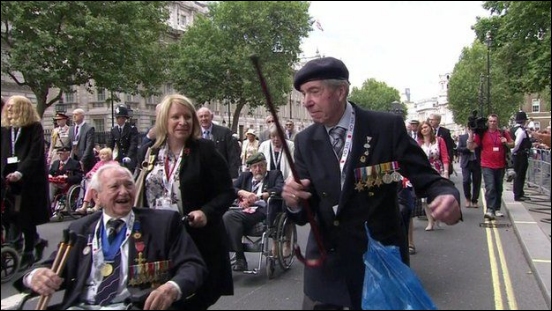Published: August 19, 2015
Burnham-On-Sea WW2 veteran joins 70th anniversary commemorations
A Burnham-On-Sea World War Two veteran joined the commemorations in London to mark the 70th anniversary of VJ Day, when Japan surrendered and the war ended.
Neville Jones attended the memorial event at Horse Guards Parade and then joined other veterans, war widows and members of their families in a procession from Horse Guards Parade to Westminster Abbey, pictured.
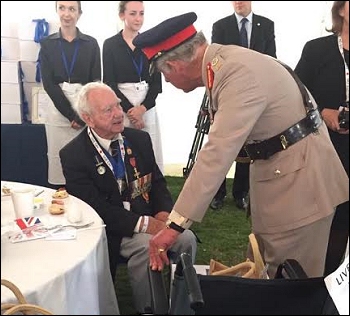 Members of the public lining Whitehall applauded as the parade went past before they were met by The Prince of Wales, pictured right.
Members of the public lining Whitehall applauded as the parade went past before they were met by The Prince of Wales, pictured right.
VJ Day ended one of the worst episodes in British military history, during which tens of thousands of servicemen were forced to endure the brutalities of prisoner of war camps, where disease was rife, and there was a lack of food and water.
It is estimated that there were 71,000 British and Commonwealth casualties of the war against Japan, including more than 12,000 prisoners of war who died in Japanese captivity.
Neville was a Sub Lieutenant onboard the carrier HMS Speaker, the first Allied ship into Tokyo Bay during World War II, pictured below.
He was one of 850 recruits onboard between 1944 and 1946 and told Burnham-On-Sea.com about his role.
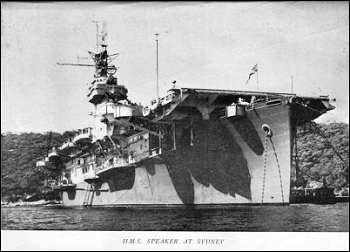 “Exactly 70 years ago this week, the second world war officially came to an end with the unconditional surrender of Japan in a ceremony onboard the mighty US battleship Missouri at anchor in Tokyo Bay. I was privileged to be there on a small escort carrier on lease-lend from the US named HMS Speaker.”
“Exactly 70 years ago this week, the second world war officially came to an end with the unconditional surrender of Japan in a ceremony onboard the mighty US battleship Missouri at anchor in Tokyo Bay. I was privileged to be there on a small escort carrier on lease-lend from the US named HMS Speaker.”
“To this 13,000 ton ship had been thrust the privilege to bring out of Japan the first 500 prisoners of war to be released from their captivity and brutality, some having survived nearly four years of terrible hardships.”
HMS Speaker was part of the protection for a massive collection of supply vessels of every shape and size, mainly consisting of merchantmen with all the supplies for troops and machines to support four fleet aircraft carriers, which flew bombing sorties over Japan.
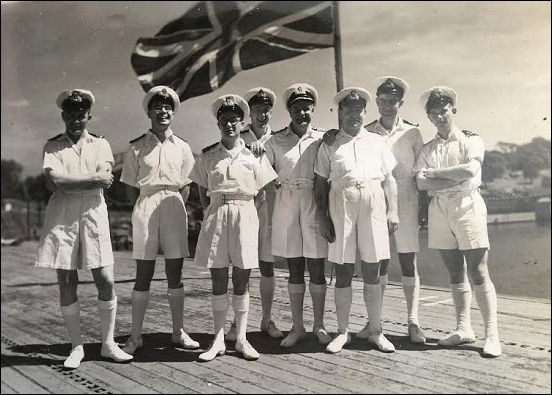
Neville Jones OBE is pictured on the far right on HMS Speaker in 1944
“My captain was ordered to leave the fleet and we became the first allied carrier to anchor in Japanese waters steaming through the line of flagships denoting such famous admirals as Nimitz and with General Douglas MacArthur onboard the South Dakota. We anchored by ourselves some five miles from the battleships and an equal distance from the shore and felt rather lost in such a huge, empty bay. However, in the next three days, most of the space was filled with allied ships – some 400 of them!”
“It was then we carried out our role to embark POWs and move into the centre of an American Rescue Group of Yokohama. Within the first five minutes, the first landing craft came alongside with waving Britishers disguised in American clothing.”
“As the POWs came slowly up the gangways their joy knew no bounds, shouting ‘Blighty, here we come’, ‘We’ve made it’ and ‘God bless Speaker’. It was then we realised how privileged and honoured we were to be selected for this initial run, the first of many to follow.”
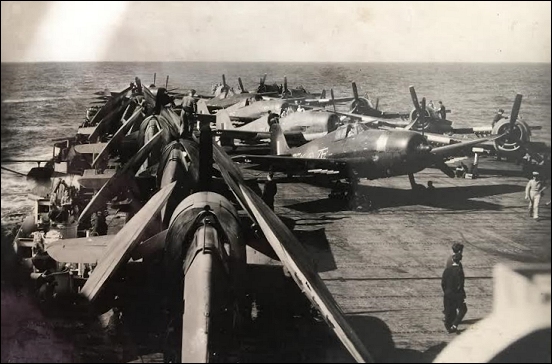
Neville’s ship, HMS Speaker, was busy throughout the conflict
“I was detailed with staff to prepare a list of all those who came aboard, their nationality and next of kin. They were British, Aussies, Americans, Canadians, many from the Indian sub-continent and lascars. This list was flashed by radio all round the world.”
“Some were emaciated and others had extended stomachs from beri-beri. Some clutched souvenirs, like Samurai swords, and one man came aboard with a double bass he’d carried from camp to camp. We also took onboard several boxes of deceased British POW ashes.”
“The chatter in the hangar was deafening, particularly when our Commander said every man would be given money to buy things in the NAAFI – the first real money some had seen for four years – and an even bigger cheer went up when he said they’d all be given a rum ration.”
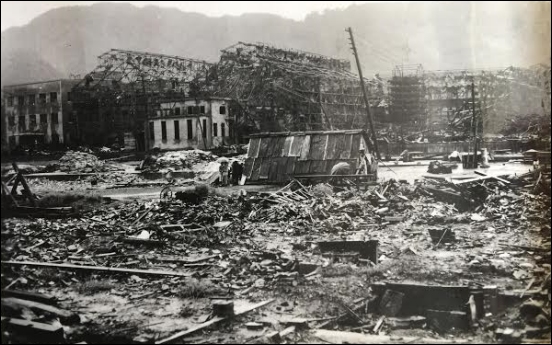
He witnessed the devastation left behind after the atomic bomb
Neville says he’s pleased with how this week’s commemorations were held. “It has been emotional at times but satisfying too to think that after 70 years the Far East hostilities are being recognised. Many think that the war ended once Hitler was dead, which wasn’t the case.”
Neville added that it was a “great honour” to have a lengthy conversation with Prince Charles during this week’s commemorations. “I was able to mention how his father had been on the destroyer HMS Whelp next to me and was present in Tokyo Bay when the instrument of Japanese surrender was signed. The Prince was so interested to hear about my experiences and said he’d mention it to Prince Phillip.”

